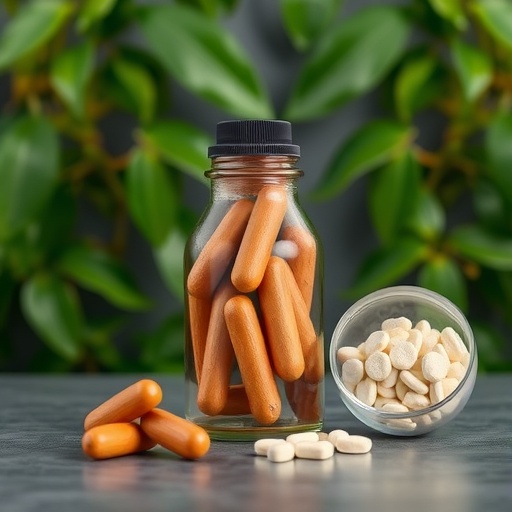In a groundbreaking study published in the Journal of Translational Medicine, researchers led by Anand Vijay delve into the anti-inflammatory effects of three distinct dietary supplement interventions. The persistent struggle against inflammation, a common underlying factor in numerous chronic diseases, has spurred significant interest in dietary modifications and supplementation as potential remedies. The findings from this research present an optimistic perspective, opening new avenues for therapeutic nutrition and preventive health strategies.
Chronic inflammation is increasingly recognized as a dangerous catalyst for conditions ranging from heart disease to various autoimmune disorders. Traditional approaches to managing inflammation often involve pharmaceuticals, which, despite their efficacy, may bring unwanted side effects. In contrast, dietary supplements offer a more natural alternative with a potentially favorable safety profile. This study aims to shed light on the specific anti-inflammatory mechanisms of three dietary supplements, thereby providing clarity in an area that has seen fragmented research.
Through a rigorous experimental design, the team conducted randomised controlled trials with a diverse group of participants. Each participant was assigned one of the three supplements—curcumin, omega-3 fatty acids, or probiotics—over a specified duration, with markers of inflammation measured before and after the intervention. Previous research indicates the promise of these supplements, but this study sought to quantify their effects systematically and comparatively.
Curcumin, the active compound found in turmeric, has been lauded for its potential health benefits. Preliminary studies suggested that curcumin could inhibit pro-inflammatory cytokines, thereby reducing inflammatory activity at the cellular level. The current research corroborates these earlier findings, demonstrating significant reductions in inflammatory markers among participants taking curcumin. The anti-inflammatory prowess of curcumin, however, is not simply due to one mechanism; it interacts with multiple pathways, which may hold immense therapeutic potential.
Omega-3 fatty acids, often touted for their heart health benefits, also emerge as worthy contenders in the anti-inflammatory arena. The study meticulously examined their impact, revealing that participants who supplemented with omega-3 showed marked reductions in systemic inflammation. The team postulated that these fatty acids contribute to the resolution of inflammation by influencing lipid mediators and promoting a shift in inflammatory signaling. This promising data aligns with ongoing discussions in the scientific community regarding dietary fats and their health implications.
Entering the fray are probiotics, the beneficial bacteria that have gained popularity in both clinical and wellness circles. The sentiment surrounding probiotics suggests they can mediate inflammation through gut health improvements, ultimately influencing the immune response. The researchers in this study provided compelling evidence supporting this notion, demonstrating that participants who used probiotics exhibited significant changes in their gut microbiota, which, in turn, correlated with decreased levels of inflammatory markers.
The implications of this study are profound, not only for individuals seeking natural anti-inflammatory strategies but also for healthcare professionals aiming to provide holistic approaches to chronic disease management. The clear evidence of dietary supplements exerting anti-inflammatory effects could catalyze a shift in paradigm regarding nutritional recommendations, especially for those susceptible to chronic inflammatory diseases.
While the study presents encouraging data, the authors stress the importance of a multifaceted approach to inflammation management. In addition to supplementation, they advocate for comprehensive lifestyle changes that include balanced nutrition, regular exercise, and attention to mental well-being. The synergy achieved through combining dietary interventions with overall lifestyle modifications could enhance the therapeutic effects observed in the study.
Moreover, the research opens the door for future investigations. The team plans to explore the long-term impacts of these dietary supplements, alongside their interactions with various medications and lifestyle factors. Understanding how these supplements can work together with other treatments will be crucial in developing tailored approaches to inflammation that take into account individual differences in genetics, lifestyle, and overall health status.
As the dialogue surrounding dietary supplements and chronic inflammation continues, this research stands as a critical contribution, underscoring the necessity of robust scientific inquiry in the realm of nutrition. As advocates for evidence-based dietary recommendations gain traction, the potential to integrate these findings into clinical practice grows ever more viable.
In a world where increasing numbers of individuals are seeking natural alternatives to pharmaceutical therapies, this research aligns with a growing public interest in personalized medicine and functional nutrition. The intersection of dietary choices and chronic health issues represents not just a field of study, but a path toward empowerment for individuals seeking to take control of their health through informed choices.
Ultimately, this research highlights the evolving landscape of dietary supplements and their implications for health. Instead of merely focusing on isolated nutrients, the conversation is shifting to holistic approaches that prioritize how these supplements can work synergistically within an individual’s broader dietary and lifestyle context. This nuanced understanding will pave the way for further breakthroughs in both research and clinical application.
As we embrace these insights, it becomes evident that the quest for optimal health is both a personal journey and a collective endeavor rooted in scientific discovery. The future of inflammation management may very well reside in our kitchens, with dietary interventions that promise not only relief but improved quality of life for countless individuals.
Subject of Research: The anti-inflammatory effects of dietary supplements
Article Title: The anti-inflammatory effects of three different dietary supplement interventions.
Article References:
Vijay, A., Simpson, L., Tooley, M. et al. The anti-inflammatory effects of three different dietary supplement interventions.
J Transl Med 23, 1081 (2025). https://doi.org/10.1186/s12967-025-07167-x
Image Credits: AI Generated
DOI: 10.1186/s12967-025-07167-x
Keywords: anti-inflammatory, dietary supplements, curcumin, omega-3 fatty acids, probiotics, chronic inflammation, health interventions.




